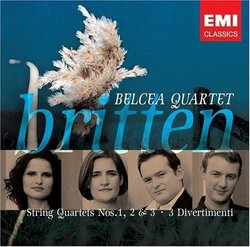| All Artists: Benjamin Britten, Belcea Quartet Title: Britten: String Quartets No. 1, 2, 3; Three Divertimenti Members Wishing: 1 Total Copies: 0 Label: EMI Classics Release Date: 5/10/2005 Genre: Classical Styles: Chamber Music, Historical Periods, Classical (c.1770-1830) Number of Discs: 2 SwapaCD Credits: 2 UPC: 724355796820 |
Search - Benjamin Britten, Belcea Quartet :: Britten: String Quartets No. 1, 2, 3; Three Divertimenti
 | Benjamin Britten, Belcea Quartet Britten: String Quartets No. 1, 2, 3; Three Divertimenti Genre: Classical
The chamber music on this CD spans almost Britten's entire career, from 1936 to 1975. The Three Divertimenti were not well received at their premiere in '36 and Britten was "downcast." While hardly masterpieces, the stormy... more » |
Larger Image |
CD DetailsSynopsis
Amazon.com The chamber music on this CD spans almost Britten's entire career, from 1936 to 1975. The Three Divertimenti were not well received at their premiere in '36 and Britten was "downcast." While hardly masterpieces, the stormy first movement's march, the second's calming waltz and the final, unsettled burlesque still hold the interest, especially when as well played as the Belceas play them. The first quartet's (1941) first movement alternates andante with allegro passages, while the second is a bristly march, the third calms the listener down and the final movement is upbeat. The second quartet, written right after the very successful premiere of Peter Grimes, is far more complex. It is in three movements. The first is an off-putting combination of depression and mania; the second, while outwardly perky (it's marked "vivace"), is creepy. But it's the last movement that is so masterful--a theme and 21 variations on a Purcell-like chaconne, which lasts 18 minutes and gives cadenzas to cello, first violin and viola. The Third Quartet, composed after "Death in Venice," uses one of its themes and is in five movements. It is a dark, forceful work with little joy--when it isn't nervous it's disheartening--but it is a fascinating and affecting piece you won't forget. The Belceas play as a team as brilliantly as they do during their individual moments. Highly recommended. --Robert Levine Similar CDs
|
CD ReviewsExceptional Performances D. A Wend | Buffalo Grove, IL USA | 11/16/2006 (5 out of 5 stars) "I would never have listened to these discs had it not been for an ecstatic Gramophone review. Now, these have become some of my favorite quartets. The First Quartet is the most memorable for me with its shimmering opening. It was written in the US in 1941 and the interaction between the instruments is extraordinary, reflecting a youthful enthusiasm. The Second Quartet followed in 1945 following the premiere of Peter Grimes and was commissioned to celebrate the 250th anniversary of Henry Purcell's birth. The dedication to Purcell comes in the final movement marked Chacony. The quartet is set out as a series of variations where the individual instruments have their own cadenzas in the first movement followed by an engaging Scherzo written with a tarantella theme. The final movement, longer than the first two together, is a reflective passacaglia. The Third Quartet was written in 1975 and was premiered after the composer's death in December 1976. It is an introspective work which, like Shostakovich's final quartets, is Benjamin Britten's farewell. It is cast in five movements, each containing a quotation from the composer's final opera Death in Venice. The quartet opens with a quiet and introspective movement named Duets. The Burlesque movement is somewhat reminiscent of the Rondo-Burleske of Mahler's Ninth and coming after the gentleness of the opening movements is rather jarring. The final passacaglia movement, titled La Serrenissima, is the composer's elegy on the end of life. The recording includes the Three Divertimenti from 1936, movements left from a projected longer work of character movements. The Belcea Quartet gives superb and sensitive performances of the quartets and the recordings are perfectly engineered. If one knows only the operas of Benjamin Britten the string quartets add a dimension that demands attention. " Stunning? YES! Daniel R. Greenfield | Milwaukee, Wisconsin, United States | 08/06/2006 (5 out of 5 stars) "I have had this album for about six months, and have listened to it many times. It has slowly come to be one of my most treasured and beloved albums. These string quartets are modern in the best sense of the word, without a lot of dissonance, and yet with lots of sharp edges, provocative phrases, and profound themes. The Belcea Quartet plays these quartets passionately but also effortlessly. They bring to these quartets a freshness and a contemporary feeling; they are forceful, poignant, and deep. The music seems to come alive, and speak with such authority, totally in synch with current times. (Now, if only we could convince Belcea to do Bartok next.) If you love chamber music, and string quartets especially, you really MUST own this recording. Sit down some evening, pour yourself a (tall) glass of pinot noir, listen to these quartets -- and be mesmerized. My advice to you, if you are still wavering, is to go out to the MusicWeb, and read the review there. You will find the word "Stunning" used of this recording. And yes, 'stunning' is probably the word that best describes it." Britten's String Quartets are given exemplary performances Grady Harp | Los Angeles, CA United States | 06/11/2006 (5 out of 5 stars) "The Belcea Quartet seems to have a particular affinity for the string quartets of Benjamin Britten. The performances here of these works (String Quartet No. 1 in D major, Op. 25, String Quartet No. 2 in C major, Op. 36, and String Quartet No. 3, Op. 94 and Divertimenti for string quartet) provide a 'travelogue' of the composer's career, allowing us to hear works from the early years, through the middle very productive years, to the last period of his composing.
Each of the Quartets is performed with what feel like utter ease - a true feat when the complexity of these compositions is understood. But the Belcea Quartet finds all of the searing melodies that span the works while giving dance to all of the virtuosic elements. This is a fine performance of chamber music too infrequently programmed. And performances such as these by the Belcea Quartet should alter that situation! Highly recommended. Grady Harp, June 06 " |

 Track Listings (7) - Disc #1
Track Listings (7) - Disc #1![Chopin: Favorite Piano [Limited Edition] [Japan]](https://nationalbookswap.com/cd//m/34/5734/6145734.jpg)


